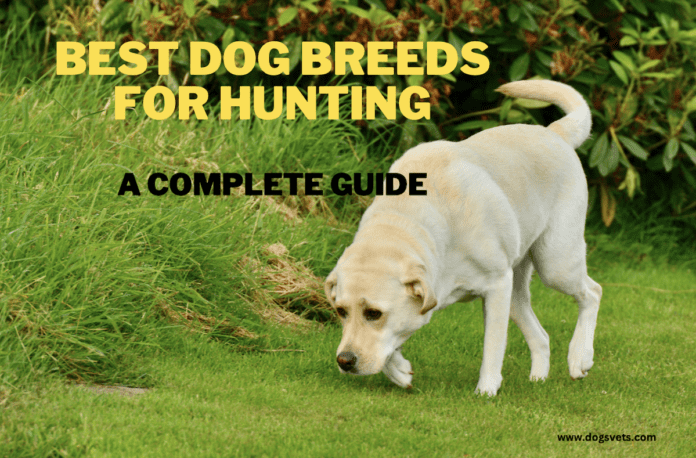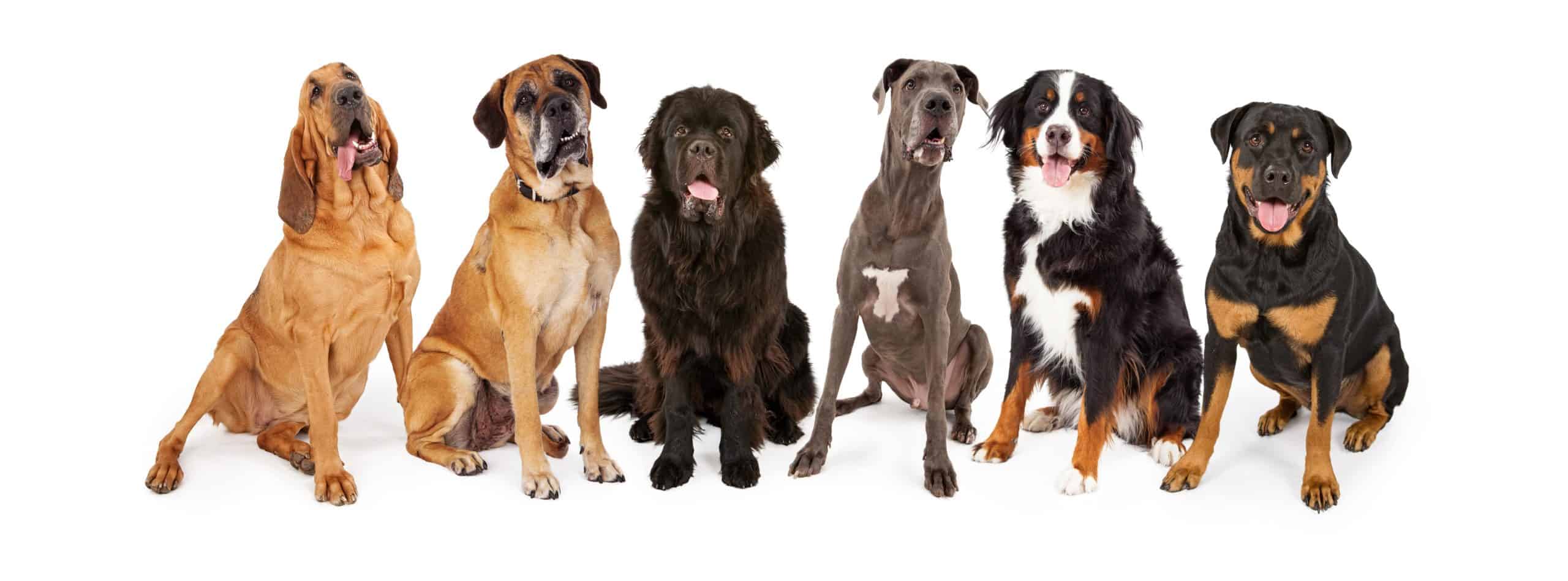Last Updated on January 28, 2023 by Dogs Vets
Unleash the Power of Hunting with the 9 Best Dog Breeds:
A Complete Guide with Breed Overview, Physical Characteristics, & Tips”
Best Dog Breeds for Hunting: When it comes to hunting, having the right dog by your side can make all the difference.
These breeds have been specifically bred and trained for hunting, and they possess the physical and mental characteristics that make them ideal for the task. They have strong prey drives, are receptive to training, have endurance, and athleticism.
In this article, we will dive deeper into the 9 best dog breeds for hunting.
We’ll provide an overview of each breed, their physical characteristics, height, weight, lifespan and tips for choosing the perfect hunting companion.
We’ll also discuss the difference between gun dogs and scent hounds, and the type of hunting each is best suited for.
First, let’s discuss the two main types of hunting dogs:
Gun dogs and scent hounds.
Gun dogs, also known as bird dogs, are used to locate prey and flush it out for the hunter to shoot. They usually retrieve the animal for the hunter.
Second: Scent hounds, on the other hand, follow prey trails with their nose, making a lot of noise while running after it. The dog’s calls enable the hunter to follow the trail even when the dog is out of sight.
Some scent hounds focus on pursuing prey, while others are “treeing” dogs that chase the prey up a tree and wait at the base until hunters arrive.
Now, let’s take a closer look at the 9 best dog breeds for hunting, their physical characteristics, and tips for choosing the perfect hunting companion.
#1. Labrador Retriever
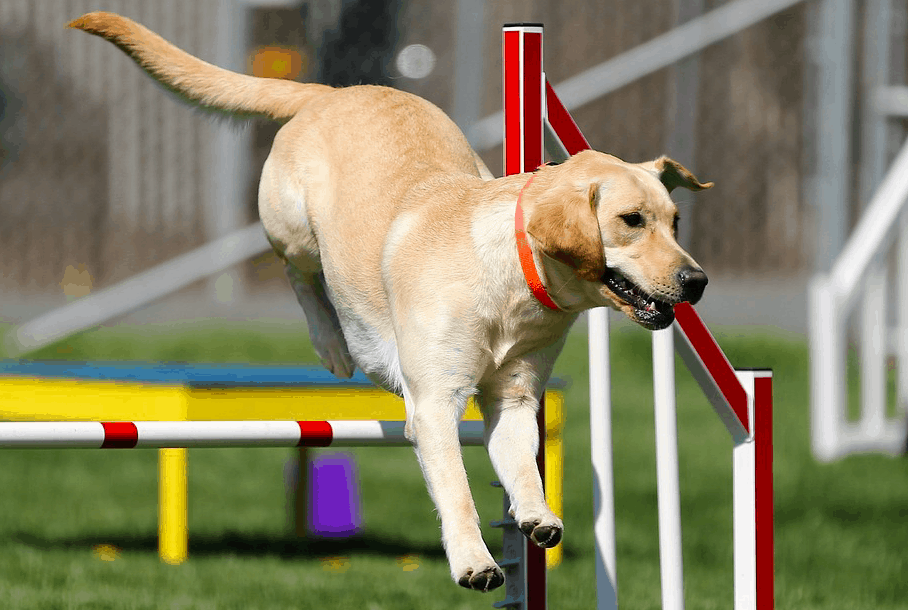
Labrador Retrievers, commonly known as Labs, are a versatile hunting breed that is known for their exceptional retrieving abilities. They are often used for hunting waterfowl, such as ducks and geese, due to their strong swimming abilities and waterproof coat.
In addition to their hunting skills, Labs are also highly sought after as family pets due to their friendly, outgoing personalities and trainability.
Labs have a sturdy and athletic build that is well-suited for hunting and other outdoor activities.
They typically weigh between 55-80 pounds and stand 21-24 inches tall at the shoulder.
Their coat is thick and waterproof, which helps them stay warm in cold water and protects them from the elements. They come in various colors such as black, yellow, and chocolate.
Labs have a lifespan of 10-12 years and are known for being healthy and robust dogs.
They are relatively easy to care for and do well with regular exercise and training. They are also highly adaptable and can thrive in both urban and rural environments.
With their friendly nature, trainability, and hunting abilities, Labs are a popular choice among hunters and families alike.
#2. German Shorthaired Pointer

German Shorthaired Pointers, or GSPs, are a breed of hunting dog that excels in finding and pointing game. They have a strong hunting instinct and are known for their stamina and endurance, which makes them great at covering large areas of land while hunting.
Additionally, they are highly trainable and are known for their intelligence and eagerness to please.
In terms of physical characteristics, GSPs have a short, smooth coat that is usually liver or liver and white in color. They have a strong, athletic build and a distinctive pointing stance when they locate game.
They are also known for their friendly and affectionate personalities, which make them great family pets. They are typically good with children and other pets, and enjoy spending time with their owners.
In terms of size, GSPs typically weigh between 45-70 pounds and stand 21-27 inches tall.
They have a lifespan of 12-14 years. They are a medium-sized breed and have a moderate energy level and need regular exercise. They are also known for their intelligence and eagerness to please which makes them easy to train.
They are an all-around great hunting dog and a loving companion for families and individuals alike.
#3. Golden Retriever
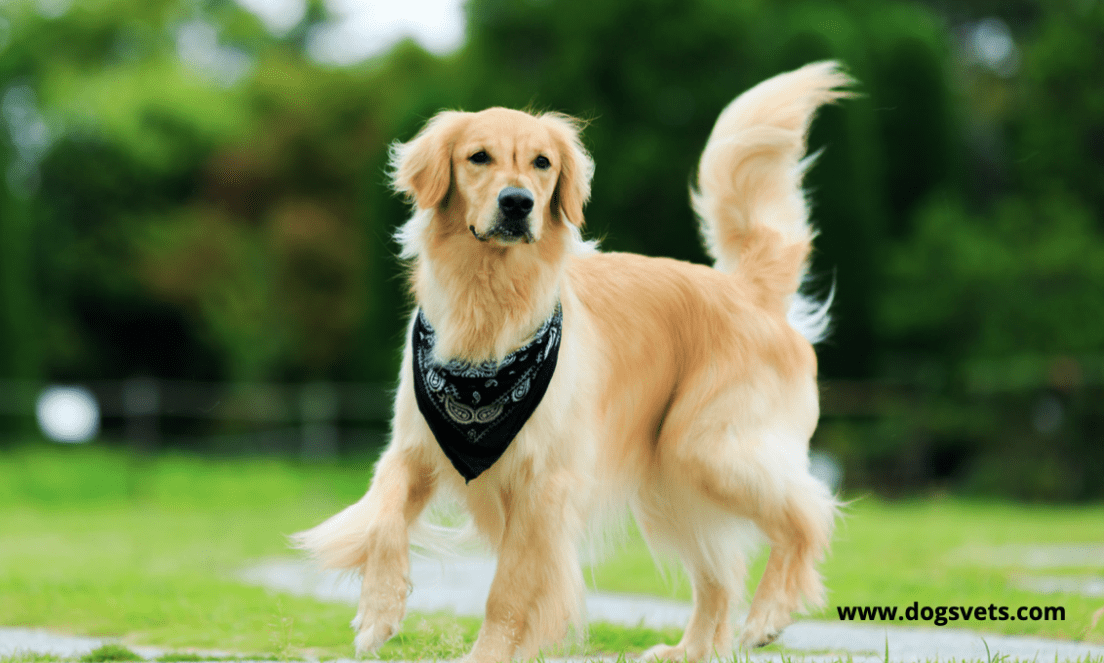
Golden Retrievers are a versatile breed that excels in hunting, specifically in retrieving game. They are known for their friendly and easy-going personalities, making them great family pets, especially with children.
They also have a thick, waterproof coat that helps them stay warm in cold water, making them ideal for hunting in wet or cold conditions.
Golden Retrievers typically weigh between 55-75 pounds and stand 21-24 inches tall.
They have a lifespan of 10-12 years. They are highly trainable and eager to please, which makes them easy to train for hunting. They are also highly intelligent and have a strong work ethic which makes them great at working in the field.
Additionally, they are known for their loyalty and affection towards their owners, which makes them great companions on hunting trips.
Overall, Golden Retrievers are a great choice for hunters who are looking for a well-rounded, friendly and trainable hunting companion.
#4. English Springer Spaniel
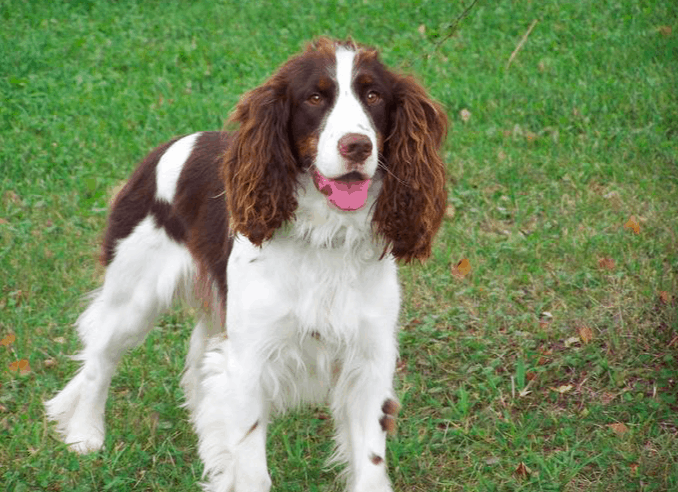
English Springer Spaniels are known for their exceptional hunting abilities and their ability to locate and retrieve game with their powerful sense of smell.
They are also highly valued as family pets due to their friendly and affectionate nature and their ability to get along well with children.
In terms of physical characteristics, English Springer Spaniels typically weigh between 35-50 pounds and stand 18-20 inches tall.
They have a lifespan of 12-15 years, making them a great companion for many years to come. They have a strong and muscular build, with a medium length coat that is typically wavy or curly.
Their coat can come in a variety of colors, including black and white, liver and white, and black and tan. They have a distinctive long and droopy ears, and a long tail that is often docked.
#5. Beagle Dog Breed
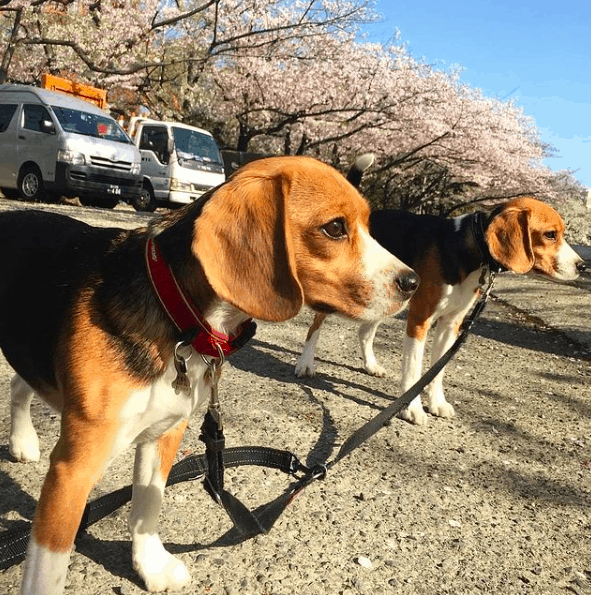
Beagles are a popular breed of small hunting dog known for their exceptional sense of smell.
They are often used for hunting small game such as rabbits and squirrels, and their small size makes them ideal for tracking and chasing through dense underbrush.
As well as being great hunting companions, Beagles are also known for their friendly and easy-going personalities, making them great family pets that are good with children.
They have a short, dense coat that is easy to maintain and comes in a variety of colors. They are a small breed, with males typically weighing between 18-30 pounds and standing 13-15 inches tall at the shoulder.
Beagles have a lifespan of 12-15 years, and with proper care and nutrition can live a long, healthy life. They are a hardy breed that is generally free from genetic health issues, and are known for their energetic and playful nature.
#6. Chesapeake Bay Retriever
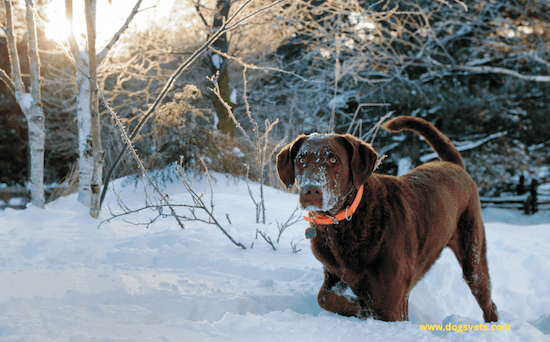
Chesapeake Bay Retrievers, or CBRs, are a versatile hunting breed that excels in retrieving game from both land and water. Their thick, wavy coat provides insulation and protects them from the elements, making them well-suited for hunting in colder climates and in water.
CBRs are also known for their strong retrieving instincts, making them a popular choice for hunting ducks and other waterfowl.
In addition to their hunting skills, CBRs are also known for their friendly and outgoing personalities. They are typically good with children and make great family pets.
Training and socialization are important for CBRs as they can be strong-willed and independent.
CBRs typically weigh between 55-80 pounds and stand 21-26 inches tall at the shoulder.
They have a lifespan of 10-12 years and are known to be healthy and hardy breeds. They require regular exercise and grooming to maintain their coat and overall health.
It’s important to provide them with a lot of mental and physical stimulation to keep them happy and healthy.
#7. Weimaraner Dog
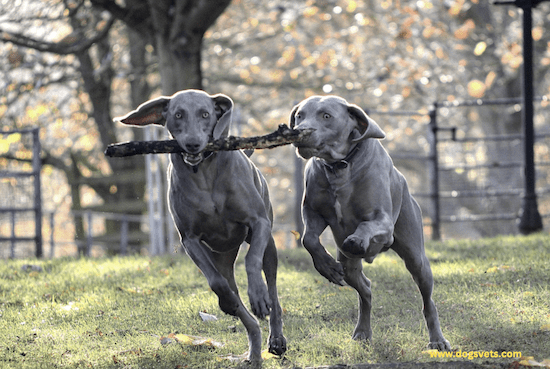
Weimaraners, also known as the “Gray Ghost,” are a versatile hunting breed that have been used for hunting a wide variety of game, including big game, small game, and birds.
They are known for their excellent sense of smell and retrieving abilities, which make them great for tracking and retrieving game. They have a sleek and athletic build, making them fast and agile hunters.
This breed is also known for their intelligence, trainability, and loyalty, making them great companions as well as hunting partners.
In addition to their hunting skills, Weimaraners are also known for being great family pets. They are friendly and good with children, making them a great addition to any household.
They are also highly trainable and eager to please, making them easy to train and trainable for various tasks.
Weimaraners typically weigh between 70-85 pounds and stand 25-27 inches tall.
They have a lifespan of 10-12 years. They are a large breed, so they require plenty of exercise and space to run. They also require regular grooming to maintain their sleek coat.
Overall, Weimaraners are a great choice for hunters and families looking for a loyal and versatile companion.
#8. Vizsla Dog

Vizslas are a versatile hunting breed that are known for their excellent sense of smell and retrieving abilities. They were originally bred in Hungary to hunt small game, such as birds and rabbits, but they are also well-suited for larger game, such as deer and bear.
They are highly trainable and eager to please, which makes them a great choice for hunters who want a loyal and dedicated companion.
In terms of appearance, Vizslas have a short, smooth coat that comes in a variety of shades, from light golden to dark copper. Their coat helps them stay cool in hot weather, which is important for hunting in warmer climates.
They have a lean and athletic build, with long legs and a deep chest that allows them to run and swim with ease.
Vizslas are also known for their friendly and outgoing personalities, which makes them great family pets. They are good with children and other pets, and they thrive on human companionship.
They are highly trainable and eager to please, which makes them a great choice for families who want a loyal and obedient companion.
In terms of size, Vizslas typically weigh between 45-60 pounds and stand 21-24 inches tall.
They have a lifespan of 12-14 years, which is a bit longer than some other hunting breeds. With proper care and training, a Vizsla can be a loving and loyal companion for many years to come.
#9. Brittany Dog
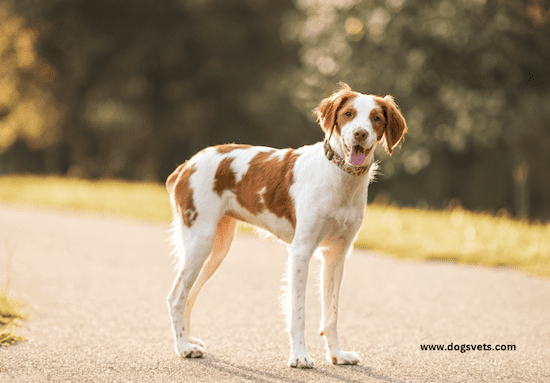
Brittanies are medium-sized hunting dogs that are known for their excellent sense of smell and retrieving abilities.
They are also known for their agility and stamina, making them great for hunting small game such as birds. They are also great family pets, as they are friendly and good with children.
Brittanies typically weigh between 30-40 pounds and stand 17-20 inches tall. They have a lifespan of 12-14 years.
In conclusion, these 9 breeds are some of the best dog breeds for hunting, each with its own unique strengths and abilities.
It’s important to note that while these breeds are known for their hunting skills, they also make great family pets.
It’s also important to research and choose the right breed that suits your specific hunting needs and lifestyle. Remember to always provide proper training, exercise, and care for your hunting dog to ensure they are happy and healthy.
Dog Breeds to Avoid for Hunting
It’s important to note that not all dog breeds are well-suited for hunting. Some breeds have a more docile or lazy nature and may not have the energy and drive necessary for hunting.
Additionally, some breeds may be prone to certain health issues that can make them less suitable for hunting.
Here are a few breeds that may not be the best fit for hunting:
Basset Hound: These dogs have a more relaxed and laid-back nature and may not have the energy and drive necessary for hunting. They also have a tendency to become overweight, which can make them less fit for hunting.
Bulldog: Bulldogs have a short snout and can have respiratory issues, which can make it difficult for them to keep up with hunting activities. They also have a more docile nature, which may not be well-suited for hunting.
Pomeranian: These small dogs have a more delicate and fragile build, which may not be well-suited for the physical demands of hunting. They also have a tendency to become yappy and may not be well-suited for hunting in terms of behaviour.
Pekingese: similar to Pomeranian, these small dogs have a more delicate and fragile build, which may not be well-suited for the physical demands of hunting. They also have a tendency to become yappy and may not be well-suited for hunting in terms of behaviour.
It is important to remember that every dog is different and that even breeds that may not be well-suited for hunting can make great pets and companions.
Here are a few tips to always keep in mind when hunting with a dog:
Start training early: Begin training your dog as early as possible. This will ensure that they are well-trained and ready to hunt by the time they are old enough.
Socialize your dog: Socialize your dog with different people, animals, and environments. This will help them stay calm and focused while hunting.
Exercise regularly: Keep your dog in good physical condition by providing them with regular exercise. This will help them stay fit and healthy for hunting.
Keep them well-fed: Feed your dog a high-quality diet that is appropriate for their size, age, and activity level. This will help them stay energized and healthy while hunting.
Keep them clean and groomed: Keep your dog’s ears and paws clean and trimmed, and groom them regularly to keep their coat in good condition.
Know the laws: Make sure you are familiar with the hunting laws and regulations in your area. Obtain the proper licenses and permits, and follow all rules and regulations while hunting.
Safety first: Always put your dog’s safety first. Keep them on a leash or in a fenced area when not hunting to prevent them from getting lost or injured. Make sure they have proper identification tags in case they get lost.
Be patient: Hunting with a dog takes patience and practice. It may take some time for your Beautiful dog to learn and become proficient at hunting. Don’t get discouraged if your dog doesn’t catch on right away.
Have fun: Hunting with a dog should be a fun and enjoyable experience for both you and your dog. Remember to take breaks and enjoy the experience of spending time outdoors with your furry companion.
Question and Answers for Best Dog Breeds for Hunting
Q: What are the best dog breeds for hunting?
A: Labrador Retriever, German Shorthaired Pointer, Golden Retriever, English Springer Spaniel, Beagle, Chesapeake Bay Retriever, Weimaraner, Vizsla, and Brittany are considered some of the best dog breeds for hunting.
Q: Are Labrador Retrievers good for hunting?
A: Yes, Labrador Retrievers are great hunting dogs and are often used for retrieving games, such as ducks and geese. They have a friendly and outgoing personalities, making them easy to train. They are also great swimmers and have waterproof coat that helps them stay warm in cold water.
Q: What are the physical characteristics of a German Shorthaired Pointer?
A: German Shorthaired Pointers typically weigh between 45-70 pounds and stand 21-27 inches tall. They have a strong hunting instinct and are known for their stamina and endurance. They are also great family pets, as they are affectionate and good with children.
Q: What is the lifespan of a Golden Retriever?
A: The lifespan of a Golden Retriever is typically 10-12 years.
Q: How big do English Springer Spaniels get?
A: English Springer Spaniels typically weigh between 35-50 pounds and stand 18-20 inches tall.
Q: Are Beagles good for hunting small game?
A: Yes, Beagles are small hunting dogs that are known for their great sense of smell. They are often used for hunting small game, such as rabbits and squirrels.
Q: Are Chesapeake Bay Retrievers good swimmers?
A: Yes, Chesapeake Bay Retrievers have a thick, waterproof coat that helps them stay warm in cold water, making them great swimmers.
Q: Are Weimaraners good family pets?
A: Yes, Weimaraners are friendly and good with children, making them great family pets.
Q: What are the physical characteristics of a Vizsla?
A: Vizslas are medium-sized dogs that typically weigh between 50-65 pounds and stand 21-24 inches tall. They have a short, smooth coat that comes in a variety of colours, including rust, golden, and bronze. They are known for their energy and endurance, making them great for hunting and other outdoor activities.
Q: What is the lifespan of a Brittany?
A: The lifespan of a Brittany is typically 12-14 years.
Q: How do I train my hunting dog?
A: Training your hunting dog is essential to ensure they are safe and effective in the field. Start by socializing your dog at a young age to get them used to new people, animals, and environments. Then, begin basic obedience training, such as sit, stay, come, and heel.
Once your dog has mastered basic obedience, you can start training them for specific hunting tasks, such as retrieving and pointing.
It’s also important to provide your dog with adequate regular needed exercise to keep them in good physical condition for hunting.
Q: How do I choose the right hunting dog breed for me?
A: Choosing the right hunting dog breed for you depends on your specific hunting needs and lifestyle.
Consider the type of hunting you plan to do, such as upland bird hunting or waterfowl hunting. Think about your living situation, such as whether you have a big backyard or live in an apartment.
Also, consider your experience level with dogs and your willingness to train and care for a hunting dog.
Research different breeds and their characteristics, and talk to experienced hunters and breeders to find the right breed for you.
Q: What are some common health issues in hunting dogs?
A: Common health issues in hunting dogs include hip dysplasia, elbow dysplasia, bloat, and ear infections. Hunting dogs also have a higher risk of injury while in the field, such as cuts, sprains, and broken bones.
Regular vet check-ups and proper care can help prevent and manage these health issues.
Q: How do I take care of my hunting dog?
A: Taking care of your hunting dog involves providing them with proper nutrition, exercise, and veterinary care.
Remember to Feed your dog a high-quality diet that is appropriate for its size, age, and activity level. Provide regular exercise, including regular hunts and other outdoor activities.
Take your dog for regular vet check-ups and keep their vaccinations up to date. Keep their ears and paws clean and trimmed, and groom them regularly to keep their coat in good condition.
Q: Can I take my hunting dog on a hunt with me?
A: Yes, you can take your hunting dog on a hunt with you. It is important to make sure your dog is properly trained and in good physical condition before taking them on a hunt.
It’s also important to follow all hunting laws and regulations in your area, such as obtaining the proper licenses and permits.
Fact Check
We hope you enjoyed reading this article. What are your thoughts on the topic?
“At [Dogsvets.com], our goal is to bring you the most accurate and up-to-date information on all things pet-related.
If you have any additional insights or would like to advertise with us, don’t hesitate to get in touch.
If you notice any errors or discrepancies in our content, please let us know so we can correct them.

